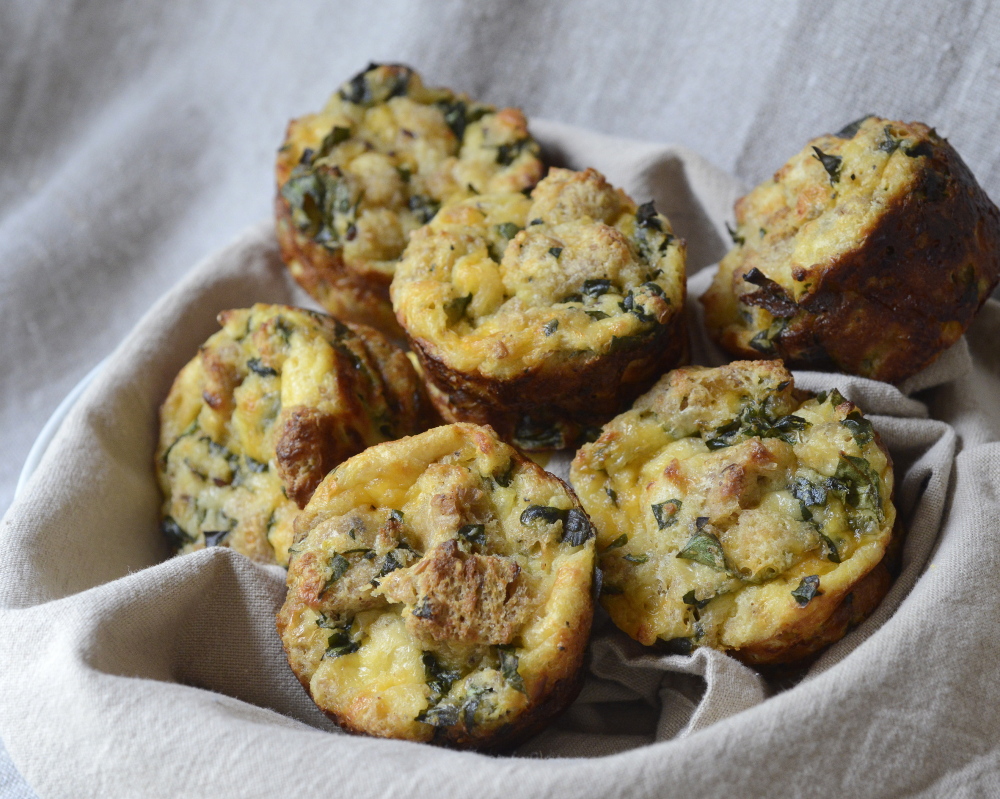In my adult life, I’ve had 17 home kitchens of my own, cooked in six restaurant kitchens, and been both student and instructor in a dozen teaching ones. I value my time in all, but none of those memories give me the gut punch of nostalgia I get when I think back to cooking in my parents’ kitchen, elbow-to-elbow with all the mothers who graced my life, whether they came in the form of Mom, grandmothers, aunts, sisters or actively reproducing Irish and Italian cousins.
It is in honor of these mothers that I present the latest Green Plate makeover. In these makeover columns, I take long-loved recipes, ideally sent to me by readers (hint, hint), and tweak them to be greener than the original in terms of how ingredients are sourced, how much energy is expended to produce them, and with an eye toward minimizing waste.
In my family, it wouldn’t be a baby or bridal shower without Aunt Joan’s Cheese Poof. It’s basically a strata – a savory bread pudding in which bread and cheese get soaked in eggs and milk overnight before the casserole is baked.
The original recipe required cutting the crusts off fresh, white bread before the soaking occurs. The revised version uses left-over bread of all kinds, cut into small enough pieces so the crusts add texture but not too much tooth, as this dish is supposed to be soft enough both for babies who don’t yet have teeth and Nonnas who’ve forgotten to put theirs in that day.
Sourcing the milk, sharp cheese and eggs from a local farmer reduces the dish’s overall carbon footprint. And adding chopped local chard or spinach gives the recipe a boost of both nutrition and color.
My own mother remembers me not liking cheese poof. At all. But that is only partly true. I loved the top and edges, where the cheese was all golden goodness, but I didn’t like the soggy bread innards. At all. Making mini-poofs in muffin tins – the original was always made in a large, deep bowl – both diminishes the soggy bread texture (a win for my palate) and reduces the baking time by two-thirds (a win for energy conservation by the home cook).
I suspect you may have a recipe or two that would benefit from a makeover. Please send it in and we will consider giving it the Green Plate treatment.
Chard and Cheese Poof Muffins
The original Cheese Poof recipe was handed down to my cousin Jean by her mother, my dad’s older sister, Joan, in 1979 in a handwritten cookbook of family recipes. Jean had moved with her new husband to Phoenix, Arizona, and was making frequent calls home to ask “Now how do I cook …?”
Makes 12 muffins
2 cups local whole milk
4 local eggs, lightly beaten
1 teaspoon ground mustard
1 teaspoon kosher salt
½ teaspoon well ground black pepper
6 cups ½-inch cubes of day (or two)-old bread, preferably local
1 cup diced local cheddar cheese (about 6 ounces)
1/3 cup unsalted butter, melted
2 cups chopped local chard or spinach leaves
The day before you plan to serve these muffins, whisk together the milk, eggs, mustard, salt and pepper in a bowl big enough to hold all of the recipe ingredients and still fit in your refrigerator. Add the bread and cheese, stir to combine, cover and set the bowl in the refrigerator for at least 6 hours.
Preheat the oven to 375 F degrees. Coat the inside of 12 muffin tins cups with some of the melted butter.
Remove the bread mixture from the refrigerator. Stir in the greens. Divide the mixture evenly among the muffin cups. Pour about ½ teaspoon of melted butter over each muffin.
Bake for 20 minutes until the top and sides are golden and the centers only slightly jiggly.
Remove from the oven, allow muffins to sit for 10 minutes before serving warm.
Christine Burns Rudalevige is a food writer, recipe developer and tester, and cooking teacher in Brunswick. Contact her at cburns1227@gmail.com.
Copy the Story LinkSend questions/comments to the editors.



Success. Please wait for the page to reload. If the page does not reload within 5 seconds, please refresh the page.
Enter your email and password to access comments.
Hi, to comment on stories you must . This profile is in addition to your subscription and website login.
Already have a commenting profile? .
Invalid username/password.
Please check your email to confirm and complete your registration.
Only subscribers are eligible to post comments. Please subscribe or login first for digital access. Here’s why.
Use the form below to reset your password. When you've submitted your account email, we will send an email with a reset code.